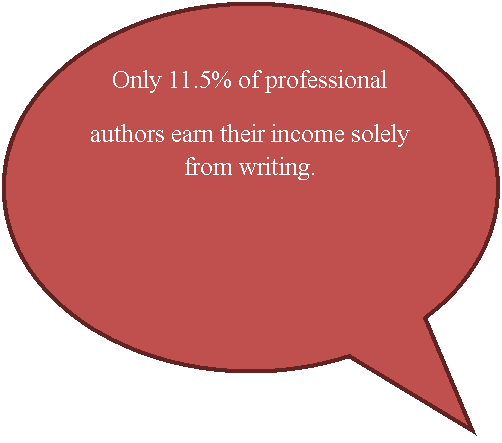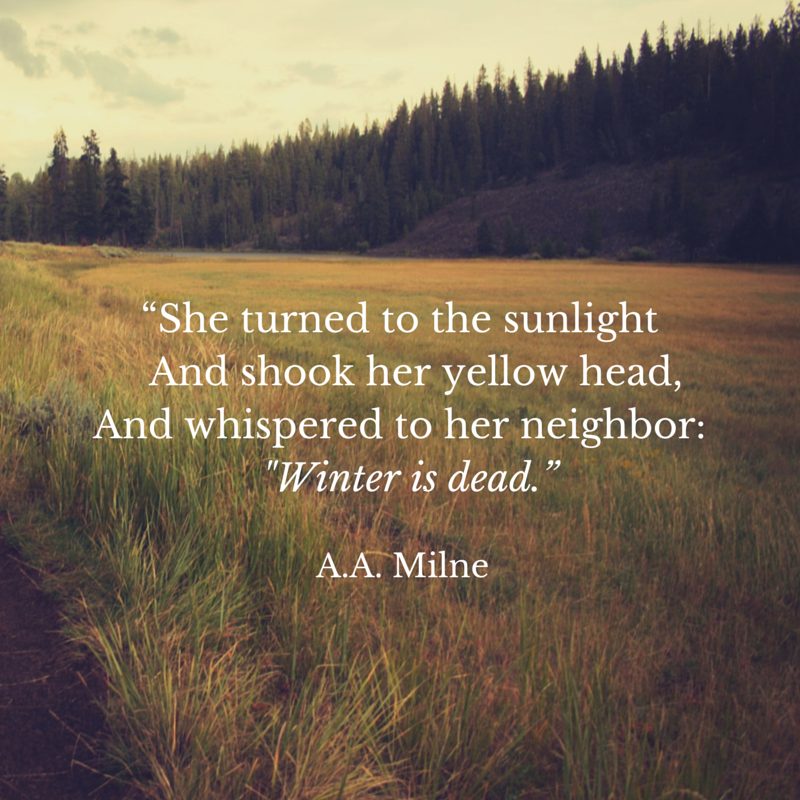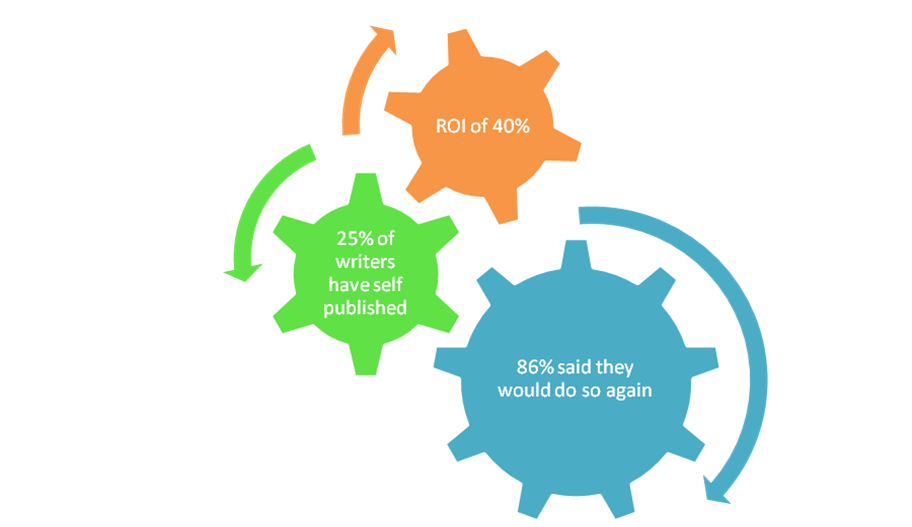I’m not a gambler, but with the top 5% of writers earning almost half of everything, it’s a safe bet that if you’re a writer you don’t earn much and, because of that, writing is not your main source of income, even when you spend most of your time doing it. Is it time, then, to change the job description from ‘profession’ to ‘vocation’?
The Great Pretender
These days, there is not such a wide gap between paid and unpaid. Profession or Vocation. In practice it is no more than semantics. Don’t shelve your dream to get something out there, if that’s what’s been stopping you. After all, most people like to see what they’ve written in print.
If you’ve yet to publish, remember you’ve already done the hard part. We invest a lot of time and emotion when we write something, and taking the next step can seem almost unattainable. Publishing puts it out there, but you are the one who has created the piece of writing and its your feelings on the line. (Sorry, couldn’t resist the pun.)
 Vast Majority Can’t Live Off Writing Alone
Vast Majority Can’t Live Off Writing Alone
In Britain, in 2005, 40% of authors earned their income solely from writing. By 2013, this had dropped to just 11.5%. This is despite being in the throes of a digital revolution. Digital is currently the third most important financial sector for writers – below books and magazines/periodicals, so print still wins out. According to the Authors’ Licensing and Collecting Society, (ALCS), ‘Digital opportunities may be out there but authors are yet to receive the full financial benefits of this growing sector.’
Not Yet Published and Wanting to Change that Stat?
Should this influence your decision of which route to take when you seek publication of your work? Broadly speaking, options available are:
- The Mainstream Big 5 Publishers, (Penguin Random House, Macmillan, HarperCollins, Hachette and Simon & Schuster)
- Independent Publishing (Indie), or
- Self-Publishing
On offer is (i) traditional offset print and digital, (ii) print on demand (POD) with digital or (iii) digital with an option to take up POD at a later date.
The Mainstream Big 5
The Big 5 publishers very much dominate offset printing and are assuming a more commanding position in digital output, too, with their own e-book ventures. They are always striving forward. (Take for example Penguin Random House’s partnering with Oyster or Simon & Schuster’s deal with digital content platform Playster). The main point to take from this is that they do not decide whether you get published, just whether they get your book or not.
Independent Publishing
Indie, as its name suggests, is smaller and more flexible. Being independent it can also be more Maverick or entrepreneurial, but this is not necessarily a bad thing. There are Independent Publishers who reserve the right not to publish your book in printed form, but still define themselves as print and digital publishers. (Although your work may not be sufficiently popular to warrant a print run, other writers on their books may justify the taking of this next step.) Small businesses scale down what they offer in order to survive, as they grow they can afford more risks. If it guarantees their success and creates a respected name by staying digital and you are one of their authors, everyone wins.
It is a curious hedging of bets, to keep the gambling metaphor going, because with POD you arguably need to inform people of the option in order to get the demand and without the orders you have no idea how to predict future sales. Putting your money on the favourite, rather than each way, does reduce your stake and your risk. Then again, how much does it actually cost to publish digitally?
The answer probably depends on the amount of Marketing you commit to. An indie Publisher with a well oiled marketing machine can help a newbie quite significantly. On the other hand, if an Indie Publisher does no more than what you can do, charges you and keeps your ISBN number, then, this may be a Vanity Publisher dressed in Indie Clothing. As in any market, buyer beware.
Indie Digital versus Digi Self-Publishing
The key differences between going with a digital publisher who may never put your books in bricks and mortar stores and doing it yourself are: Digital Book Cover Design, Know-How and Marketing Reach.
(i) Digital book cover design
This can be as simple as selecting a free template from Amazon Kindle Direct Publishing (KDP). Their Cover Creator lets you make one based on an image you provide or a selection from their gallery of customisable stock images. After all, how difficult can it be? It’s not going to be printed.
(ii) Know-How
Also potentially as straightforward as following the instructions from KDP. In the past you might have assumed that it would also include editing skills. Not these days. Some digital Indie Publishers do assume editing responsibilities, but not all. Perhaps that is the practical difference between a traditional author/publisher relationship and a hybrid author/solutions provider. Some solutions providers charge to edit the work, some Indie Publishers refuse to accept work that has not yet had that final polish. The overlap is clear. Perhaps the rule of thumb that separated vanity publishers from independent publishers should again be used: Do you have to pay?
(iii) Marketing Reach
This could be the deal breaker. It is something that all publishers now expect their authors to participate in. For example, a Social Media Platform which incorporates FaceBook, You Tube, Twitter and a blog page is apparently de rigueur. Naturally, this can impose seemingly insurmountable barriers for the uninitiated and technophobes, but once set up they can be very easily managed.
Self-Publishing
The third way, self-publishing, is attractive. To quote an online advert for an accumulator, ‘Sometimes you’ve just got to take the money and run.’ And if you are brave enough to assume command and Self Publish you may surprise yourself by your winnings.
The ALCS says, ‘Just over 25% of writers have self-published a work, with a typical return on their investment of 40%. Unsurprisingly, 86% of those who had self-published said they would do so again.’
Smashwords founder Mark Coker says in Publishers Weekly, ‘In 2015, self‑published authors are learning to think and act like professional publishers. They’re embracing best practices, and learning to use professional tools of the trade such as pre-orders, professional cover design and they’re hiring professional editors.’ Yes, professional editors are a must.
Leave ‘Never Never Land’.
Seemingly, it all depends on a marketing platform rather than technical turf assessments or crossed fingers and a determined look in the eyes of a thoroughbred. Still, what is not known is how much of any platform is random. If you have published once you’ll do it again. If you’ve never tried it yet, now’s the time to join the ranks of published authors and it’s never made more economic sense. All you have to do is press and be pressed.
Tracy Thomson
//





